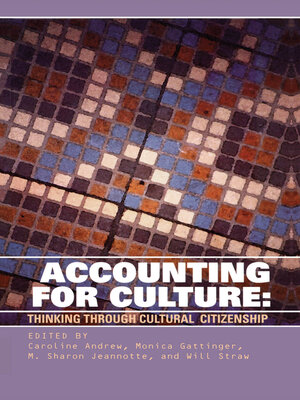Accounting for Culture
ebook ∣ Thinking Through Cultural Citizenship · Governance Series
By Caroline Andrew

Sign up to save your library
With an OverDrive account, you can save your favorite libraries for at-a-glance information about availability. Find out more about OverDrive accounts.
Find this title in Libby, the library reading app by OverDrive.



Search for a digital library with this title
Title found at these libraries:
| Library Name | Distance |
|---|---|
| Loading... |
Many scholars, practitioners, and policy-makers in the cultural sector argue that Canadian cultural policy is at a crossroads: that the environment for cultural policy-making has evolved substantially and that traditional rationales for state intervention no longer apply.
The concept of cultural citizenship is a relative newcomer to the cultural policy landscape, and offers a potentially compelling alternative rationale for government intervention in the cultural sector. Likewise, the articulation and use of cultural indicators and of governance concepts are also new arrivals, emerging as potentially powerful tools for policy and program development.
Accounting for Culture is a unique collection of essays from leading Canadian and international scholars that critically examines cultural citizenship, cultural indicators, and governance in the context of evolving cultural practices and cultural policy-making. It will be of great interest to scholars of cultural policy, communications, cultural studies, and public administration alike.
The concept of cultural citizenship is a relative newcomer to the cultural policy landscape, and offers a potentially compelling alternative rationale for government intervention in the cultural sector. Likewise, the articulation and use of cultural indicators and of governance concepts are also new arrivals, emerging as potentially powerful tools for policy and program development.
Accounting for Culture is a unique collection of essays from leading Canadian and international scholars that critically examines cultural citizenship, cultural indicators, and governance in the context of evolving cultural practices and cultural policy-making. It will be of great interest to scholars of cultural policy, communications, cultural studies, and public administration alike.







